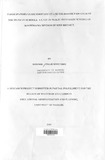| dc.contributor.author | Song'oro, Birundu J | |
| dc.date.accessioned | 2013-04-30T09:45:25Z | |
| dc.date.available | 2013-04-30T09:45:25Z | |
| dc.date.issued | 2003 | |
| dc.identifier.uri | http://erepository.uonbi.ac.ke:8080/xmlui/handle/123456789/17960 | |
| dc.description | Master of Education in Educational Administration and Planning | en |
| dc.description.abstract | The major purpose of the study was to establish the extent to which secondary school principal use participatory leadership styles in school administration. The study also sort to determining whether the age, administrative experience and academic qualification had influence i encouraging participation in school leadership. The study also investigated the problems that the principals face in school management especially student unrest. On the literature review the researcher focused on leadership and discipline. Participation in school leadership as a means or promoting school democracy is also discussed in detail. The role of prefects in school leadership is also dealt with because they also play a positive role in assisting the school administrators. The role of communication in participative leadership is given priority as information is important in any organization. Interaction of all school community members to enhance teamwork in our schools is also discussed. The study was ex-post facto in design and the target population consisted of 16 principals and 118 teachers of public secondary schools of Kiamokama division in Kisii district The principals and teachers questionnaire were used in the study. The items in the questionnaire were tested for content validity and reliability by means of a pilo study. The pilot study enabled the researcher to make alterations on inappropriate items in the questionnaires. After collection of data it was analyzed using the Likert rating scale. The t-test was used to determine the level of significance The study came out with the following research findings:- I. There is no significant relationship between principals' gender and discipline In public secondary schools in Kiamokama division. 2. There is a significant relationship between principals' administrative experience and discipline of students in public secondary schools. 3 There is no significant relationship between the principals' academic qualification and discipline problems in public secondary schools. 4. There is no significant relationship between the age of the principal and discipline or public secondary school students in Kiarnokama division Kisii district. 5. The principals' religious affiliation has no relationship with discipline problems experienced by students in public secondary schools. The recommendation of the study are as follows:- I. Guidance and counseling to be strengthened in schools. This will help in minimising student unrest thus promoting interaction between students and teachers. Students to be involved in school management so that they may get an opportunity to give suggestions and express their problems freely. 3. Punishment is essential for effective school administration. This is because it will serve as a correction to any misbehaviour to avoid repetition of unwanted acts in schools. 4. Drawing of school rules is a necessity in all schools so as to be a reminder to students and parents to avoid a situation of lawlessness. 5. Caning should be re-introduced in schools. This has been suggested as a better means of controlling students which is in agreement with the biblical teachings. b. Improving of communication in schoo! This will avoid collision in school activities thus promoting co-ordination and satisfaction of decisions that arc carried out. | en |
| dc.language.iso | en | en |
| dc.publisher | University of Nairobi | en |
| dc.title | Participatory leadership styles and their effect on student discipline in schools: a case of public secondary schools in Kiamokama Division of Kisii District | en |
| dc.type | Thesis | en |
| local.publisher | Department of Education; University of Nairobi | en |

